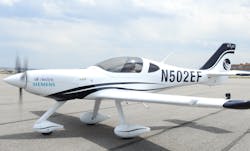OXIS Energy to develop proof-of-concept advanced, lightweight lithium sulfur cells for Bye Aerospace
OXFORD, UK - OXIS Energy is collaborating with Bye Aerospace of Denver, Colorado to produce a common lithium sulfur advanced battery cell for the high voltage battery pack system to be considered for Bye's future electric aircraft. These cells will achieve the higher energy density required for such aircraft. The project will commence in September 2019.
Huw Hampson-Jones, CEO OXIS Energy, said, "Aviation is one of OXIS' target markets, and in the first instance, Regional Rapid Air Taxi Transportation. A key measure of OXIS' suitability is to be able to consistently produce cells in excess of 400 Wh/kg, which are already undergoing evaluation. OXIS expects to achieve 500 Wh/kg by early 2020. Our Li-S cells and battery systems are ideally suited for aviation. They are over 50% lighter than the current Li-ion cell and battery systems, with the winning formula of a high energy cell at the power required. The use of the same cell format across batteries will also help our customers to minimise cost and improve serviceability."
George Bye, CEO of Bye Aerospace, said, "New Li-S battery cells from Oxis have the potential to greatly enhance the quality, cost and performance of eFlyer 4 and our other future aircraft projects. Our collaboration with OXIS is separate from the current eFlyer 2 agreements and intentions we have with confirmed and our future supply chain partners. Bye Aerospace is working with Oxis on the Li-S battery cell characteristics to significantly improve our eFlyer 4 and future air taxi aircraft designs' performance. The average age of the global market for Turboprop fleet is 28 years. OXIS has the potential to provide a Li-S battery cell that is truly a game-changer."
In ground tests in Europe, OXIS has already shown that Li-S has demonstrated a significant improvement in simulated flight duration compared with Lithium NMC; it will now undertake a further series of tests which will provide a robust indication of the OXIS Li-S performance.
Over the next 18 months, the aim is to move towards the production of commercial cells and battery systems in order to meet the volume roll-out criteria set by Bye Aerospace.
